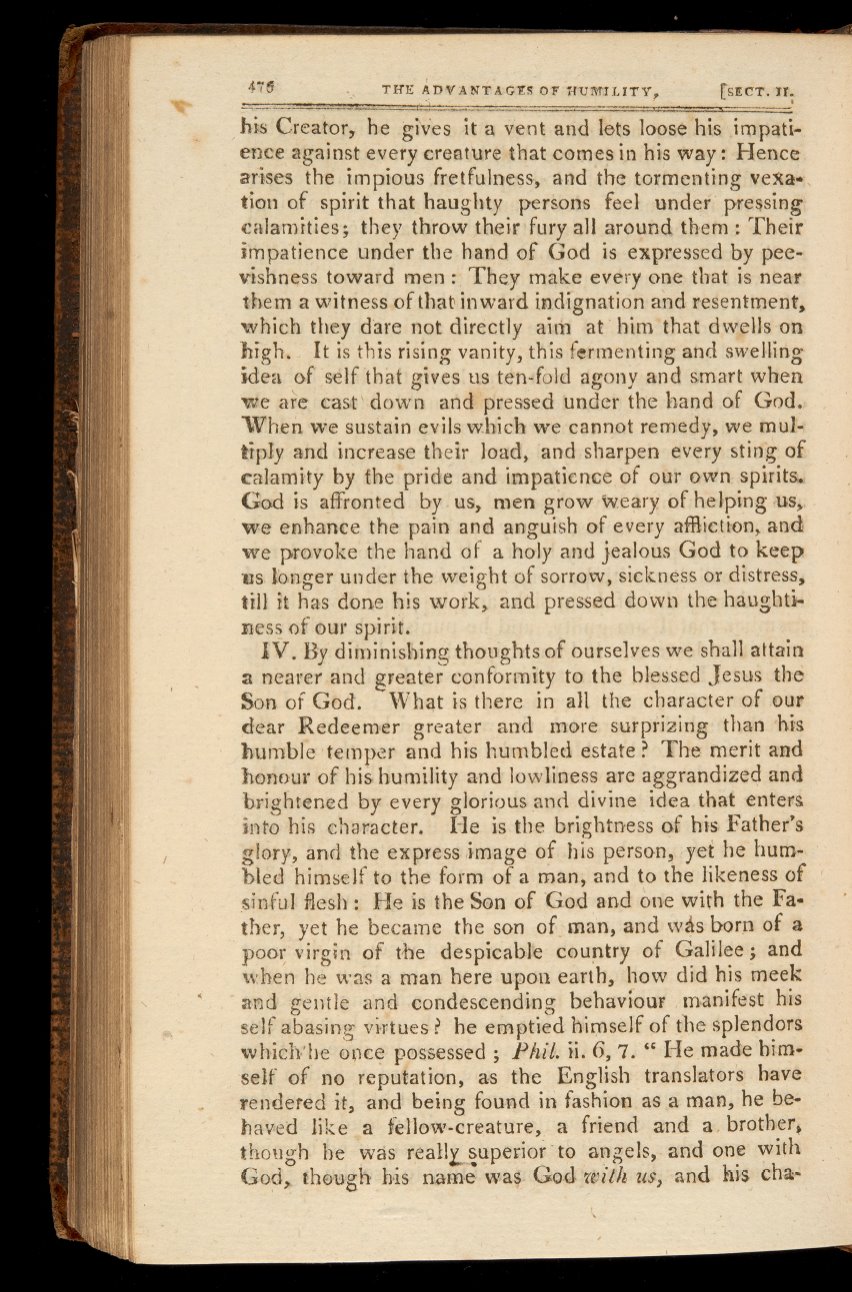

475
TT-
E
ADVANTAGES
OF
NU:MLLITY,
his
Creator,
he
gives
it a
vent and
lets loose his
impati-
ence against
every
creature
that
comes
in
his
way
:
Hence
arises
the impious fretfulness, and
the
tormenting vexa-
tion of spirit
that haughty
persons feel
under
pressing
calamities;
they
throw their
fury all
around
them
:
Their
impatience under the
hand
of
God
is
expressed
by
pee-
vishness
toward
men
:
They
make
every
one that
is
near
them
a
witness of
that inward
indignation
and
resentment,
which
they dare
not directly
aim
at
him
that
dwells
on
high.
It
is
this rising vanity, this
fermenting and
swelling
idea
of self
that
gives
us
ten
-fold
agony and smart
when
we are
cast
down
and pressed
under the hand
of
God.
When
we sustain
evils
which
we
cannot
remedy,
we
mul-
tiply and increase
their load,
and sharpen
every
sting
of
calamity
by
the pride and
impatience of our own
spirits.
God
is
affronted
by
us,
men grow weary
of helping
us,
we
enhance
the pain and anguish of
every
affliction,
and
we
provoke the
hand of
a holy
and
jealous God
to
keep
us longer
under
the weight
of sorrow, sickness
or
distress,
till
it
has done his
work,
and pressed down
the
haughti-
ness
of
our spirit.
IV.
By
diminishing
thoughts of
ourselves we
shall
attain
a nearer and
greater
conformity
to
the
blessed
Jesus
the
Son
of
God.
What
is
there
in
all
the
character of
our
dear
Redeemer
greater and
more
surprizing than
his
humble temper
and
his
humbled
estate
?
The
merit and
honour of
his humility
and
lowliness are
aggrandized
and
brightened
by
every
glorious
and
divine idea that
enters
into his
character.
Ile
is
the brightness
of
his
Father's
glory, and the express image
of
his
person, yet he hum-
bled himself
to
the
form
of
a
man, and
to
the likeness
of
sinful
flesh
:
He
is
the
Son
of
God and
one
with the Fa-
ther,
yet he
became the
son
of man, and
was
born of a
poor
virgin
of
the
despicable country of
Galilee;
and
when
he was
a
man here upon
earth,
how did his meek
and gentle and condescending behaviour
manifest
his
self
abasing virtues? he emptied himself
of
the splendors
which'he
once
possessed
;
Phil.
ii.
6, 7.
"
He
made him-
self of
no
reputation,
as
the
English translators have
rendered
it, and
being found
in
fashion
as a
man,
he be-
haved like
a
fellow-
creature,
a
friend and
a
brother,
though
he was
reallx superior
to
angels, and
one
with
God, though
his
name
was
God
with
us,
and
his
cha-
rsECT.
rr.

















